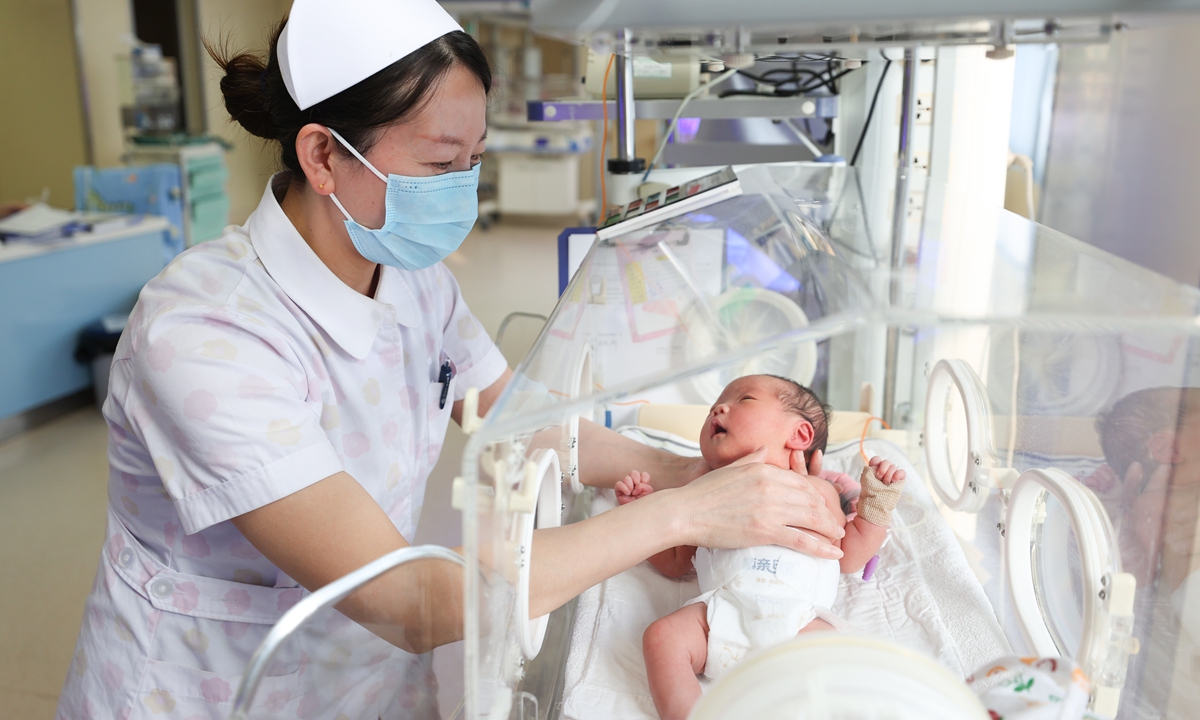
A medical staff member cares for a newborn at the neonatal care unit of a hospital in Lianyungang, East China's Jiangsu Province on January 1, 2024. Photo: VCG
After China unveiled a plan for special initiatives to boost consumption, including the potential establishment of a childcare subsidy system, Li Chunlin, a deputy director of the National Development and Reform Commission, said Monday that relevant authorities have been actively formulating childcare subsidies, which will be introduced progressively, CCTV News reported.
A total of 23 provincial-level regions across the country have introduced childbirth subsidies at various levels, mostly benefiting families with a second or third child, the People's Daily reported on Monday.
Childcare subsidies generally come in two forms: one-time cash payments and recurring allowances, the report said. For example, in Hefei of East China's Anhui Province, eligible couples receive a one-time subsidy of 2,000 yuan ($276.3) for the birth of a second child and 5,000 yuan for the birth of a third child.
In Jinan, East China's Shandong Province, eligible families with local household registration receive 600 yuan per month for each second or third child until the child turns 3 years old, the People's Daily reported.
In Northwest China's Ningxia Hui Autonomous Region, registered couples who have a second or third child after January 1, 2023, and register the child's household locally, qualify for a one-time subsidy of 2,000 yuan for a second child and 4,000 yuan for a third child. Additionally, they will receive a monthly childcare subsidy of 200 yuan per child until the child reaches the age of 3 years old.
However, the People's Daily's report found out that most childcare subsidies apply only to families with a second or third child, leaving families with only one child outside the preferential policy.
Guided by China's macro policies, various regions have tailored measures to their specific circumstances, including one-time payments and monthly allowances. These policies "have alleviated family burdens, encouraged childbirth and demonstrated policy support," Jiang Quanbao, a professor from the Institute for Population and Development Studies at Xi'an Jiaotong University, told the Global Times, on Monday.
Following the rollout of the special action plan to boost domestic consumption, local governments are likely to further strengthen subsidy programs, Jiang said. The measures may include an increase in the subsidies based on the current levels, and the coverage of subsidies is expected to be broader, according to Jiang.
Hohhot, the capital of North China's Inner Mongolia Autonomous Region, recently drew public attention by announcing a 100,000 yuan subsidy for families having a third child. Zhang Hongmin, head of the population, family and elderly health department at the Hohhot Health Commission, was quoted as saying in a report by Beijing Daily on Monday that the purpose of this policy is to provide direct financial support to help families share part of the childcare costs, alleviate concerns about having children due to financial pressure, and ultimately increase the birth rate.
Lei Anqi, an associate professor at the Department of Public Administration and Sociology at Ningxia University's Faculty of Law, suggested increasing subsidy amounts, moderately raising third-child subsidies, and considering benefits for first-child families to enhance policy incentives
Lei told the Global Times on Monday that authorities could expand the scope of eligibility, gradually relaxing subsidy application requirements, and including non-registered residents who have lived and worked in a region for a long time to improve the policy's inclusiveness.
Lei also called for better childcare support, including expanding affordable childcare institutions, reducing family childcare costs, and increasing willingness to have children.
Lei emphasized the need to establish a long-term security mechanism by promoting joint funding from central and local governments to ensure the stability of subsidy policies. She also suggested comprehensive measures such as tax breaks, housing support, and workplace-friendly policies to create a sustainable childbirth incentive system.
The support for childbirth is a "systematic project," Jiang noted, emphasizing that in addition to subsidies, complementary policies, such as childcare, education and housing support should also be explored. Jiang noted that support for families with their first child could also be considered.
East China's Zhejiang Province recently issued a special action implementation plan to boost and expand consumption, saying that in accordance with national policies, a childbirth subsidy system will be established to provide subsidies to eligible families, the Securities Times reported on Monday.
The plan also encourages local governments with sufficient resources to issue marriage consumption vouchers and childcare vouchers and to develop basic public services for inclusive childcare, according to the report.




